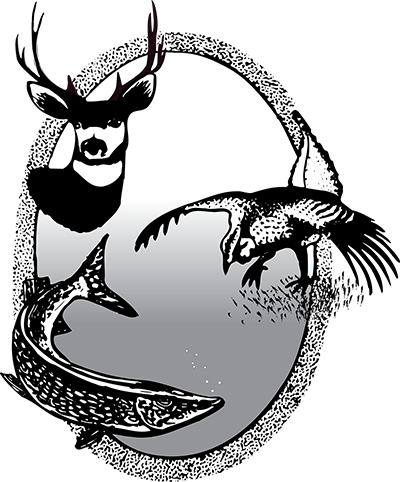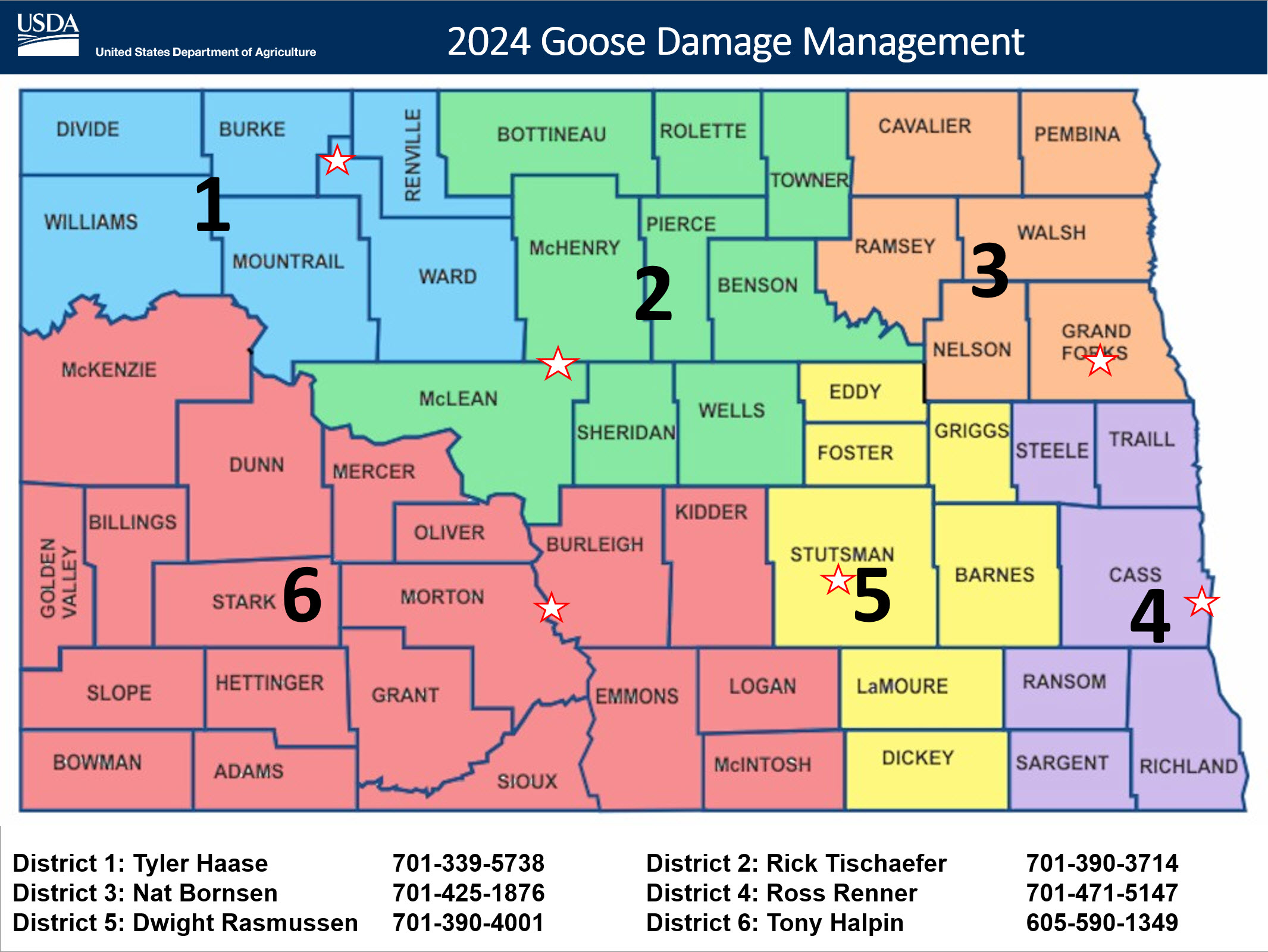
Canada Goose Agricultural Depredation Control FAQs
- What is a Canada Goose Agricultural Depredation Control Permit?
- Who does this apply to?
- How do I obtain a permit?
- Why must I submit an annual report?
- What if I have Canada goose problems that are not related to agricultural crop depredation?
- What if I have problems with crop depredation by other wildlife or problems caused by other wildlife species?
- What are the conditions or rules for a Special Canada Goose Permit?
- Who should I contact with questions?
- Where can I find additional information on how to manage goose problems?
What is a Canada Goose Agricultural Depredation Control Permit?
Canada geese are migratory birds that are protected by international treaties, the federal government and the states. The U.S. Fish and Wildlife Service has issued a Special Canada Goose Permit to North Dakota Game and Fish Department that allows the lethal-take of Canada geese that are causing agricultural depredation problems within the state. The Department’s permit allows Game and Fish to issue sub-permits to agricultural producers and their designated agents so that they may legally take geese that do not respond to non-lethal deterrents; nests and eggs can also be taken. The intent of the permit is not broad-scale population control, but rather to reduce numbers of geese in localized areas during the growing season through a combination of non-lethal and lethal measures.
Who does this apply to?
Agricultural producers anywhere in North Dakota that have previously worked with USDA-Wildlife Services.
How do I obtain a permit?
- If you have had a permit in the past and you have submitted the annual reports that are required by the permit, you may apply for a permit this year on this website. If you do not wish to apply on this website, you may submit a paper application as you have done in the past.
- Applicants who renew through this website will be able to print their completed permit immediately and will not have to wait for signed paperwork to be sent to them. In addition, website applicants will be able complete their annual reports online through this website.
- If you have not had a permit in the past, you must contact the USDA-Wildlife Services to arrange a site visit and to obtain approval in order to receive a permit application. USDA-Wildlife Services contact information is provided below.
- Individuals who do not comply with permit stipulations will be removed from the program.
Why must I submit an annual report?
The U.S. Fish and Wildlife Service Special Canada Goose permit issued to the North Dakota Game and Fish Department requires that we monitor and document the activities conducted under this permit and report this information to the federal government annually. The information required includes the number of birds, nests and eggs taken, the location and time of take and the disposition of the birds, nest and eggs taken under each permit. Failure to submit annual report, or follow permit stipulations will result in removal from the permit program.
What if I have Canada goose problems that are not related to agricultural crop depredation?
Individuals, agencies or organizations experiencing aircraft safety, human health and safety and nuisance problems cause by Canada geese should contact the North Dakota Game and Fish Department to explore options available for dealing with these issues. Contact information is provided below.
What if I have problems with crop depredation by other wildlife or problems caused by other wildlife species?
Individuals, agencies or organizations experiencing crop depredation, aircraft safety, human health and safety or nuisance problems caused by wildlife other than Canada geese should contact the North Dakota Game and Fish Department to explore options available for dealing with these issues. Contact information is provided below.
What are the conditions or rules for a Special Canada Goose Permit?
The following conditions and stipulations will apply to Special Canada goose permits issued by the ND Game and Fish Department (NDGFD) to producers. Failure to abide by permit stipulations will result in nullification of the permit and rejection from future permit requests.
- A signed request for a permit from the producer must initially be submitted to NDGFD. IF YOU HAVE HAD A PERMIT IN THE PAST AND YOU RENEW ONLINE THERE IS NO NEED TO SUBMIT A SIGNED PAPER APPLICATION.
- Permit approval will require consultation and prior written recommendation from USDA Wildlife Service's personnel.
- Producers must have prior documented Canada goose crop depredation with USDA Wildlife Services and exhausted other prevention methods as prescribed by USDA Wildlife Services.
- Permits are valid only on the described property from April 1 - August 14.
- Permitted control activity is limited to resident Canada geese and their nests and eggs.
- Permitted control activity is limited to the producer and up to five individuals of his/her choice to act as control agents.
- Producer must designate and list the name and personal information of all individuals (up to five) who will serve as control agents on his/her property.
- All individuals authorized (control agents) by permit to remove geese or destroy nests must have a copy of the permit in their possession when carrying out any control activities.
- Permits will not be granted to, nor can a producer list, a control agent that is less than 15 years of age.
- Permitted control activity is limited to producer's property and crop fields (land description of property must be specified on permit request).
- The property owner or occupant of the land in which control activities have been permitted must allow, at any reasonable time, including during actual operations, free and unrestricted access to any US Fish and Wildlife Service (FWS) special agent, FWS refuge officer, or NDGFD warden (or Director’s designee) on the premises where they are, or were, conducting activities.
- Records must be kept on all activities and an annual report must be submitted to NDGF on the supplied form by 1 September. Failure to submit the required report in a timely manner will result in denial of a permit in subsequent years.
- Permits allow the removal of up to 60 Canada geese (any age) and the destruction of up to 15 nests and any egg within these nests via egg addling per permit. Authorization to take additional birds/nests may be requested.
- Permits allow the use of shotguns (less than or equal to 10 gauge in size using only non-toxic shot) and the use of centerfire rifles (rimfire rifles are not allowed).
- Geese are only allowed to be shot on land.
- Geese may not be shot from any vehicle.
- Removal of geese and destruction of nests via addling must be used in combination with other non-lethal scaring devices.
- Calls, blinds, and decoys are not allowed for control activities.
- All geese that are dispatched must be documented with their method of disposal reported to NDGFD on final report form.
- Geese killed may not be made available for sale, barter, may not be sold or bartered or shipped for sale or barter including their plumage, nests or eggs.
- Permits require the burning, burying, or donation of any geese that you kill (buried geese must be in the ground, covered by at least 6 inches of soil with no protruding parts. Burned geese must be completely destroyed by fire so no useable parts remain). Donation of the dead geese as food to a charitable organization is also allowed.
Federal law requires that all geese be disposed of properly, otherwise future permits from US Fish and Wildlife Service to NDGFD (and landowners) will be denied.
If a violation of these conditions or stipulations should occur, the act will be considered an illegal take of a migratory bird and the individual(s) involved will be charged as per Chapter 20.1-04 of the North Dakota Century Code or the Federal Migratory Bird Treaty Act and will be ineligible for a future special Canada goose permit. A permit will not be granted to any producer, nor can a producer name a control agent, that is involved in any state or federal wildlife investigation (associated with Canada goose depredation control). No permits will be granted retroactively. Any taking of Canada geese, nests or eggs prior to permit issuance will be considered a violation of pertinent State and Federal regulations.
Who should I contact with questions?
If you have questions about your permit or how to obtain a permit contact:
North Dakota Game and Fish Department 701-328-6610 or 701-328-6351
Where can I find additional information on how to manage goose problems?

